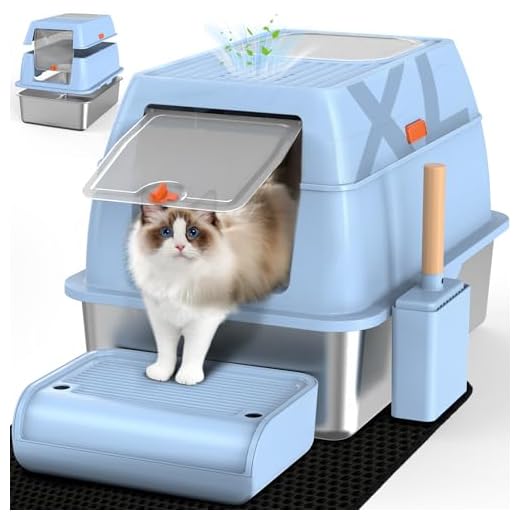




It’s essential to be aware that the consumption of waste from felines can pose significant health risks to canines. If your furry friend has a tendency to feast on this type of waste, immediate action is necessary to prevent potential health complications.
One of the primary concerns is the transmission of parasites, particularly Toxoplasma gondii, which can lead to severe gastrointestinal distress in canines. Symptoms may include vomiting, diarrhoea, and lethargy. If you observe any of these signs, consulting a veterinarian is crucial for prompt diagnosis and treatment.
Additionally, waste can harbour bacteria such as Salmonella and E. coli, which can cause serious infections. Ensuring your canine is kept away from litter boxes and areas where waste may be present is a proactive step in safeguarding their health. Regular training and positive reinforcement can help discourage this behaviour.
Be vigilant about your pet’s habits, and don’t hesitate to seek professional advice if you suspect they’ve ingested any harmful substances. Keeping your environment clean and monitoring your furry friend closely will contribute to their overall well-being.
Potential Risks of Ingesting Feline Waste
Ingesting feline excrement can pose significant health risks for canines. Parasites, such as Toxoplasma gondii, can be found in litter box droppings, leading to serious health issues. Symptoms of infection in canines may include vomiting, diarrhoea, and lethargy. Immediate veterinary attention is advisable if these signs appear after exposure to feline faeces.
Common Symptoms to Watch For
If your furry friend has had an unfortunate encounter with cat waste, be vigilant for the following signs:
| Symptom | Description |
|---|---|
| Vomiting | Frequent or severe throwing up can indicate gastrointestinal distress. |
| Diarrhoea | Loose or watery stools may suggest an infection. |
| Lethargy | Unusual tiredness or lack of energy is a warning sign. |
| Loss of Appetite | A sudden disinterest in food can signal health issues. |
Preventive Measures
To reduce the chances of your canine companion encountering these risks, keep litter boxes in areas that are inaccessible to them. Regularly cleaning the litter box can also help decrease the likelihood of contamination. If your pet is struggling with weight issues, consider exploring the best diet food for overweight dogs to maintain their health and vitality.
The Dangers of Coprophagia in Dogs
Avoid allowing your furry friend to ingest faeces, as it can lead to serious health issues. While some dogs may find this habit appealing, it poses significant risks that every owner should be aware of.
Health Risks
- Parasites: Ingestion of contaminated waste can introduce parasites like roundworms and tapeworms into your pet’s system.
- Bacterial Infections: Faeces can harbour harmful bacteria, such as Salmonella and E. coli, which can result in gastrointestinal disturbances.
- Nutritional Deficiencies: This behaviour may indicate a lack of certain nutrients in their diet, prompting them to seek out alternative sources.
Behavioural Causes
- Stress or anxiety can lead to this undesirable behaviour as a coping mechanism.
- Curiosity or boredom may drive some pets to explore waste as a source of interest.
- Lack of proper training and supervision can reinforce this habit, making it more likely to occur.
To tackle this issue, maintain a clean environment and supervise outdoor time. If the behaviour persists, consulting a veterinarian or a professional dog trainer is advisable. Addressing the root cause is key to helping your pet break free from this unwholesome habit.
Common Parasites Found in Feline Faeces
Preventing exposure to parasites is crucial for maintaining your canine’s health. The following parasites are frequently detected in feline excrement:
Toxoplasma gondii
This protozoan can infect a variety of animals, including canines. Transmission occurs when a dog ingests sporulated oocysts from contaminated sources. Symptoms in affected canines may include lethargy, fever, and respiratory issues. Regular deworming and preventing access to potentially contaminated areas are key preventive measures.
Roundworms (Toxocara cati)
Roundworms are common in cats and can pose a significant risk to dogs. These parasites can be transmitted through ingestion of their eggs. Symptoms may include vomiting, diarrhoea, and abdominal swelling. To mitigate risk, ensure your dog is on a consistent deworming schedule and keep their environment clean.
Adopting proper hygiene practices and ensuring regular veterinary check-ups will help safeguard your furry friend from these parasites. Always consult with a veterinarian if you suspect any health issues related to parasite exposure.
Symptoms of Illness After Ingesting Cat Faeces
If your furry friend has consumed feline droppings, be on the lookout for specific signs of distress. Common symptoms include vomiting, diarrhoea, and lethargy. These indicators can manifest within hours or even days post-ingestion, depending on the pathogens present in the waste.
Gastrointestinal Issues
Watch for abdominal pain, bloating, or excessive gas. These symptoms often accompany gastrointestinal upset and can lead to dehydration if not addressed promptly. If your canine companion has ongoing vomiting or loose stools for more than 24 hours, a veterinary visit is essential.
Neurological Symptoms
In more severe cases, neurological signs such as disorientation, tremors, or seizures may occur. These symptoms can arise from parasites like Toxoplasma gondii, which may affect the nervous system. If you observe any of these concerning signs, seek veterinary advice immediately.
Preventing Your Dog from Eating Cat Faeces
To keep your furry friend safe, establish a designated area for your feline companion’s litter box that is completely out of reach. Elevate the box onto a shelf or secure it behind a baby gate, ensuring your pooch can’t access it. This simple barrier can significantly reduce the temptation for your pet to investigate.
Regularly clean the litter box, removing any waste promptly. The less time the faeces spend in the box, the fewer chances your canine has to indulge in this behaviour. Consider using a covered litter box to further minimise access.
Training plays a crucial role. Teach commands such as “leave it” or “no” to create a clear understanding of boundaries. Reward your dog with treats when they obey, reinforcing positive behaviour. Consistency is key; practice regularly to ensure these commands are effective.
Distract your dog with engaging toys or activities whenever they seem interested in the litter area. Keeping their mind and body occupied will lessen their curiosity. Regular exercise also helps reduce boredom, which can lead to unwanted behaviours.
If your canine continues to show a strong interest in the litter box, consider consulting with a veterinarian. They can provide insights on underlying behavioural issues or health concerns. Addressing these factors can help modify your dog’s actions effectively.
Veterinary Advice on Coprophagia
If your furry friend has a habit of consuming faeces, it’s essential to consult with a veterinarian for tailored guidance. This behaviour, known as coprophagia, can lead to various health issues, making professional advice crucial.
Key Recommendations
- Schedule a full health check-up to rule out underlying conditions.
- Discuss dietary adjustments that may discourage this behaviour.
- Inquire about supplements that can improve nutrient absorption, potentially reducing the urge to scavenge.
- Ask for behavioural modification techniques to curb this habit.
Follow-Up Care
After implementing changes, monitor your canine companion closely. Regular updates with your vet are essential to evaluate the effectiveness of the strategies employed. Document any changes in behaviour or health, as this information can aid in further recommendations.
Consider engaging in positive reinforcement training. Reward your pet for ignoring waste in the environment. This method can promote better habits and strengthen your bond with them.
Understanding the Behaviour of Dogs Who Consume Faeces
To address the issue of why some canines indulge in the habit of consuming excrement, it’s crucial to recognise that this behaviour, known as coprophagia, often stems from various factors. One common reason is nutritional deficiency. If a furry friend lacks certain nutrients, they may instinctively seek out alternative sources, even if these are unappealing to humans.
Another aspect to consider is curiosity. Dogs are naturally inquisitive creatures. Young pups, in particular, explore their surroundings through taste, leading them to nibble on anything they encounter, including waste. This exploratory behaviour may diminish as they mature, but it often requires intervention to prevent it from becoming a habit.
Stress and anxiety can also trigger this behaviour. When a canine feels overwhelmed or insecure, they may resort to eating faeces as a coping mechanism. Observing your pet’s environment and making necessary adjustments can help alleviate their stress levels.
Additionally, some dogs learn this behaviour from observing others. If a canine sees another engaging in this act, they might mimic it, reinforcing the behaviour. It’s essential to supervise interactions with other animals to discourage such actions.
To address coprophagia effectively, positive reinforcement training can be beneficial. Rewarding your furry companion for ignoring waste and focusing on appropriate items can help redirect their behaviour. Consistency and patience are key when working on this issue.
Lastly, ensuring your dog receives a balanced diet tailored to their specific needs can significantly reduce the likelihood of this behaviour. Regular vet check-ups will help maintain their health and address any underlying issues contributing to this habit.
Treating Health Issues Related to Coprophagia
If your furry friend has developed a taste for faeces, swift action is necessary to address potential health problems. The first step is to consult a veterinarian for a thorough examination. They can check for parasitic infections, digestive issues, or nutritional deficiencies that may be contributing to this behaviour.
Dietary Adjustments
One effective strategy is to enhance your canine’s diet. Ensure it’s rich in high-quality protein and includes sufficient fibre, which can help reduce cravings for non-food items. Adding digestive enzymes or probiotics can also promote gut health, making it less likely for your dog to seek out waste for nutrients.
Behaviour Modification Techniques
Incorporating training techniques can be beneficial. Use positive reinforcement to reward your dog for ignoring faeces during walks or playtime. Redirect their attention with toys or treats to reinforce desirable behaviours. Regular exercise can also alleviate boredom, reducing the urge to engage in this troubling habit.
Additionally, maintaining a clean environment is crucial. Regularly clean areas where your pet plays or explores. In cases where the presence of feline waste is unavoidable, consider using gas powered pressure washers for efficient cleanup. Keeping the area tidy can significantly decrease the likelihood of your dog encountering faeces.








